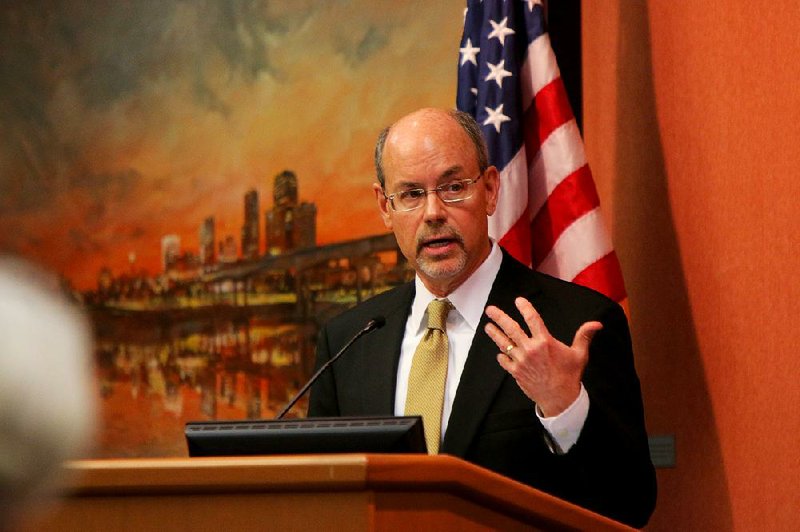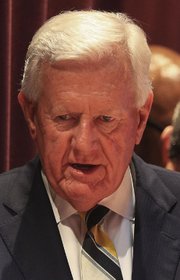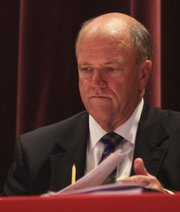The University of Arkansas System board of trustees is weighing whether to add rules that would restrict some of its actions and behaviors.
Outgoing Chairman Ben Hyneman of Jonesboro proposed changes to board policy 100.9, which currently lays out rules for the 10-member panel's standards of conduct, conflict of interest, disclosure and prohibited activities.
The proposed revisions would allow only the board chairman to speak for the panel as a whole, prohibit trustees from discussing the contents of closed executive session meetings, and introduce a new rule tightening how trustees request and obtain information from campuses.
"I wanted to propose some of those changes to just focus the attention of the board," Hyneman said, saying the proposal would bring more order to information requests and would not overburden campus and system administrators. "It didn't add so much as it clarified. And hopefully, in my opinion, it would improve the operation of the board ... and keep things flowing in an appropriate fashion."
[DOCUMENT: Read the proposed board policy change]
Hyneman's recommendations come after trustees were thrust into the spotlight with their executive session meetings during turnover in the University of Arkansas, Fayetteville's athletic department. However, Hyneman said, his proposal was not in response to anything specific. Instead, he said, these were just suggestions on improving how the panel operates.
Many institutions have similar policies, guidelines or procedures about governing bodies, and some are in more detail, he said.
But Frank LoMonte, professor and director of The Brechner Center for Freedom of Information, said it was not his impression that most college or university boards have controls or restrictions on what trustees can ask for or what they can speak about.
"A lot of these trustees are CEOs, captains of industry, really important people," he said. "To try to tell a person who is the manager of a big law firm who they can and cannot talk to would not go over great. A lot of these people got where they are because they were friendly with the governor. And you don't want to have a throw-down with somebody who plays golf with the governor."
[DOCUMENT: Read board chairman's memo on policy change]
LoMonte, who is the former director of the Student Press Law Center, added that the change did not seem like good governance or practice.
"This might have struck somebody as an OK idea before Michigan State [University]," LoMonte said of the proposed revisions. "But, if you've been following the news over the last week, it doesn't seem at all plausible -- the idea that we're going to trust a president's word over everything seems completely antiquated now."
Michigan State University President Lou Anna Simon resigned last week after widespread criticism about how the university handled reports of sexual abuse by Larry Nassar, the former USA Gymnastics and Michigan State University doctor who pleaded guilty to 10 counts of criminal sexual conduct. More than 250 women and girls accused Nassar of sexual assault.
An ESPN Outside the Lines investigation also has scrutinized how the Michigan university responded to accusations against athletes of sexual assault, violence and sex discrimination, finding a "pattern of widespread denial, inaction and information suppression."
"I have to believe that Michigan State is going to cause university trustees to completely rethink ... how they do business, be more transparent, be more independent minded in oversight, and to not trust everything they're told at face value," LoMonte said. "You would think there would be a cultural change of more information and more sources."
Hyneman had considered the proposed changes for about a month as his 10-year service on the board was winding down. He initially sent the amendments to fellow trustees Jan. 17, including a memorandum that explained his recommendations.
"With 10 interested trustees, the system and our institutions receive multiple requests for information weekly, sometimes daily. ... The requests from the board are in addition to other information requests, including FOIA requests, that the system and our campuses receive each week," Hyneman wrote. "While it is appropriate and expected that trustees show interest in learning about the system and our many campuses and units, it is important that we do not bog down our leadership and staff with unnecessary work that could adversely impact the other important business underway across the system."
He added: "Further, when information is prepared for just one trustee, it puts the other trustees at a disadvantage, particularly if the information is released publicly."
In a later interview, Hyneman said he wanted to ensure that board members are all on the same page and all have correct information. As an example, he said, a trustee could ask a campus official a question, and the official may have answered it to the best of his ability. But maybe it wasn't exactly right, he said. The trustee may have also made a statement based on that inaccurate information, he said.
The amendments call for trustees to file information requests through UA System President Donald Bobbitt, chancellors or chief executive officers of divisions or units.
"Trustees agree to avoid direct individual intervention in matters related to academics, finances, students, athletics or the administration of any of the institutions or units of the system," the proposed revisions read. "Trustees understand that the University of Arkansas System is a large and diverse system that significantly impacts the economic, cultural and social progress of the state. Trustees commit to learn about all units of the entire system and refrain from concentrating their efforts on one specific unit in an institution."
Hyneman said his intentions were "in no way" to deter any trustee from getting information he may want.
"Doing it the way I had proposed, it would just funnel things through the appropriate committee [of the board]," he said. "The chairman of that committee would be aware of the request, could determine if it was directed to the appropriate place and just make sure that information was getting circulated to everybody."
It's not about asking for too much information, he said. It's a matter of how one goes about doing it.
Maybe trustees are not asking the right person for that information, he said, and maybe it's disruptive to the provider of the information to be focusing on a request rather than something with a set deadline.
He added that it's helpful to have a policy that new trustees can turn to when directing inquiries.
"A lot of times, you have one guy going off [the board], like me, and a new guy coming on," he said. "To have a policy like that helps the new person to see how the board operates."
Hyneman talked to Bobbitt about the matter, and the president pointed the trustee to Arkansas State University System's board policies on standards of conduct and principles of board service. Most of Hyneman's proposed changes mirror the ASU System's policy, which was adopted in 2007.
UA Trustee Cliff Gibson of Monticello said the proposed revisions to board policy are "in line with what's going on, as I appreciate it, around the nation."
"That's reason, in my book, to look at it," he said, mentioning the ASU and University of Texas systems' policies.
The University of Texas System prohibits board regents, excluding the chairman, from making statements "on an obviously controversial subject which might reasonably be construed as a statement of the official position" of the system.
That system's policy also requires that regents issue most information requests -- the exception being requests that do not require significant time to process -- to the chancellor, with copies given to the board chairman and the system's top lawyer. It sets a time frame in which the chancellor must respond.
LoMonte, of the Brechner Center at the University of Florida, said he guaranteed that the University of Texas System's policies stemmed from "a noisy trustee who wanted to be more inquisitive and get more documents."
The University of Texas, earlier this decade, became embroiled in a high-profile scandal after one of its regents, Wallace Hall, accused university President Bill Powers of enrolling the children of well-connected Texans even if their grades didn't measure up.
The accusation stemmed from a system-hired investigator's report, which Hall followed by requesting thousands of pages of unredacted student records in an effort to prove the scheme and determine who benefited from it.
The Texas Supreme Court ultimately ruled against Hall in his bid for the records, finding that he did not have the standing to sue after the university refused to disclose the records. The battle prompted Powers' resignation and continued with the next president. Hall was replaced as a regent one year ago.
Hyneman drafted the proposed changes and asked UA System officials to look at it and help him "clean it up."
"I think they were amenable to it," he said of system administrators. "They helped me prepare what I wanted to do. I think the board, in my opinion, was largely receptive to it with some clarifications."
Bobbitt has not been available for an interview on the potential revisions this week. On Wednesday, he said through a spokesman that questions a reporter sent through email were regarding "a possible board policy."
"We feel like only the board should speak to these issues," said Nate Hinkel, UA System spokesman. "We are a great resource to the board and work under their direction."
The proposal went before the board for a vote last week, but Trustee John Goodson of Texarkana said he wanted to think more about it and revisit it later that day. It never went back before the board that day. Goodson did not return a message from a reporter since that board meeting.
Incoming chairman Mark Waldrip of Moro said he expects the panel to take up the matter again at its March meeting in Monticello. The proposal is a clarification of the organizational structure of the board, particularly the committees of the panel, Waldrip said.
"I think the need for clarification and reinforcement is pretty common over time -- not just on this board but in many organizations [as] we go about day-to-day business for weeks, months and years," he said. "And we gravitate into the way we do things and it becomes very comfortable and it periodically is necessary to refresh ourselves on what the most efficient ways are that we can operate."
LoMonte said trustees, as part of a governing entity, should be able to gather information from anyone who has it.
"The idea that the president could be a bottleneck for information really handcuffs the trustees in being able to be independent watchdogs over the president," he said. "It's not going to be a very effective check and balance on that president. It consolidates a lot of authority on chancellor and president, and doesn't give trustees a lot of autonomy for oversight abilities."
A Section on 02/01/2018


